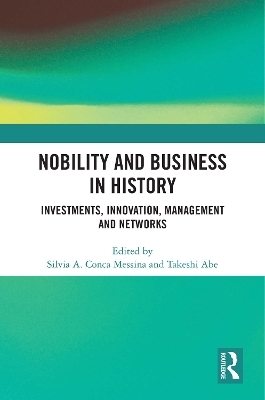
Nobility and Business in History
Routledge (Verlag)
978-1-032-44956-2 (ISBN)
What was the contribution of the nobility to the economy? Can we consider noblemen to have been endowed with an entrepreneurial spirit? Research shows that far from being passive, throughout the century the European nobility were widely involved in business, carried on innovations, refined management strategies, and diversified their investments from agriculture to transport, industry and finance. Both in Europe and Asia businesses were embedded in social networks and personal relationships. In modern Japan after the Meiji Restoration - the unique case in Asia where a Western-style nobility was created - business, trust, personal connections and aristocratic marriages were intertwined and Japanese noblemen, especially the richer ones, acted as promoters of industrialisation, even though their role was certainly limited in time and space. This volume will be of great interest to scholars and researchers in the fields of economics, management, political science, sociology, public management and history. The chapters in this book were originally published as a special issue of Business History.
Silvia A. Conca Messina is Associate Professor of Economic History in the Department of Historical Studies at the University of Milan, Italy. She recently edited Leading the Economic Risorgimento. Lombardy in the 19th Century, Routledge, 2022. Takeshi Abe is Professor Emeritus of Osaka University, Japan, and is former President of the Business History Society of Japan (BHSJ). He is one of the editors of Region and Strategy in Britain and Japan: Business in Lancashire and Kansai 1890-1990, Routledge, 2000.
Preface—Nobeconomy: Nobility and Business in History Introduction—Noblemen in business in the nineteenth century: The survival of an economic elite? 1. Far from the passive property. An entrepreneurial landowner in the nineteenth century Papal State 2. The noble entrepreneurs coming from the bourgeoisie: Counts Bettoni Cazzago during the nineteenth century 3. Agriculture and nobility in Lombardy. Land, management and innovation (1815–1861) 4. Exemplifying aristocratic cross-border entrepreneurship before WWI, from a Portuguese perspective 5. The Genoese nobility: Land, finance and business from restoration to the First World War 6. Family entrepreneurial orientation as a driver of longevity in family firms: A historic analysis of the ennobled Trenor family and Trenor y Cía 7. An aristocratic enterprise: The Ginori porcelain manufactory (1735–1896) 8. Nordic noblemen in business: The Ehrnrooth family and the modernisation of the Finnish economy during the late 19th century 9. Socio-economic activities of former feudal lords in Meiji Japan 10. A gateway to the business world? The analysis of networks in connecting the modern Japanese nobility to the business elite
| Erscheinungsdatum | 15.03.2023 |
|---|---|
| Verlagsort | London |
| Sprache | englisch |
| Maße | 174 x 246 mm |
| Gewicht | 780 g |
| Themenwelt | Mathematik / Informatik ► Mathematik ► Finanz- / Wirtschaftsmathematik |
| Wirtschaft ► Betriebswirtschaft / Management ► Finanzierung | |
| Wirtschaft ► Betriebswirtschaft / Management ► Unternehmensführung / Management | |
| Wirtschaft ► Volkswirtschaftslehre | |
| ISBN-10 | 1-032-44956-X / 103244956X |
| ISBN-13 | 978-1-032-44956-2 / 9781032449562 |
| Zustand | Neuware |
| Haben Sie eine Frage zum Produkt? |
aus dem Bereich


